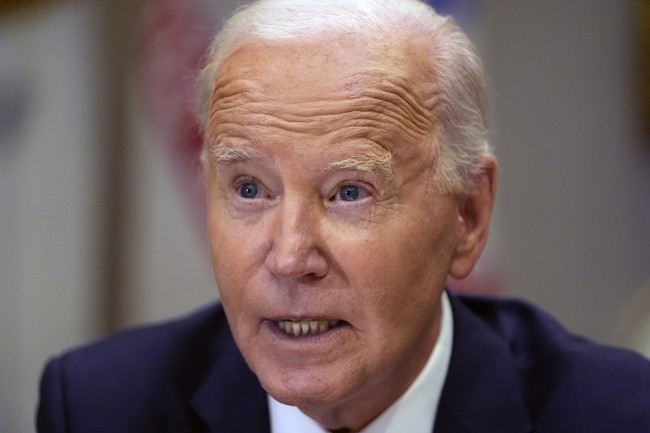To be fair, Joe Biden advised reporters that his administration does not “allow” Israel to respond to attacks. Biden and his team merely “advise” Israel.
And then apparently flap their gums about it at the first possible opportunity:
“We’re discussing that. I think that would be a little… anyway,” Biden told reporters at the White House when asked if he supported Israel striking Iran’s oil facilities.
He also said he did not believe any Israeli strikes against Iran would come on Thursday, as the region tensely awaits a response to Tehran’s massive missile attack on Israel.
“First of all, we don’t ‘allow’ Israel, we advise Israel. And there is nothing going to happen today,” Biden said when asked if he would allow Israel to retaliate against Iran.
That’s funny. Biden sounded as though he had veto power yesterday when he asserted that he would oppose a strike on Iran’s nuclear facilities. “The answer is no,” Biden responded when asked whether that option was on the menu for an Israeli response. He also made it clear that the Israelis would have to abide by the West’s ideas of proportionate response:
“We’ll be discussing with the Israelis what they are going to do,” added Biden, who spoke Wednesday morning with fellow leaders of the Group of 7 nations.
“All seven of us agree that they have a right to respond, but they should respond proportionately.”
Hmmm. Iran and its proxies — to the extent they exist at the moment — have launched somewhere around 25,000 missiles at Israel since October 7. Should Israel launch 25,000 strikes on targets in Iran to satisfy the G-7’s idea of proportionality? How about 180 strikes aimed at population centers, the exact number that Iran launched in one series of ballistic-missle strikes? Would that pass muster with Biden?
Somehow, I doubt it would.
A strike on Iran’s oil production capacity would be one obvious choice for a punishing retaliation against Tehran. Talking about it openly, however, is incredibly stupid. Oil prices jumped today after Biden let that slip, and analysts now worry about Iranian reaction to the threat:
Speaking to CNBC’s “Street Signs Europe” on Thursday, Bjarne Schieldrop, chief commodities analyst at Swedish bank SEB, said escalating tensions in the Middle East could have dramatic consequences for the market.
“If … you really took out the oil installations in Iran, force down the exports by 2 million barrels, then the next question in the market will be what will happen now in the Strait of Hormuz? That, of course, would add a significant risk premium to oil,” Schieldrop said.
Asked the extent to which oil prices could spike in such a scenario, Schieldrop replied, “If you take out installations in Iran, easily you go to $200-plus.”
You’d better believe that the Iranians are already moving assets to punish Western nations by attempting to close the Strait of Hormuz if the Israelis strike. They can choke off oil and pressure the G-7 into concessions by doing so, or force the West to go to war to keep the Strait open.
That’s why it’s best to keep your mouths shut about strategic and tactical responses in wartime. That’s a lesson that Biden has never learned, of course, which is why the Israelis no longer include them in such plans when they become operational.
A strike on the oil facilities certainly would do a lot of damage to Iran’s economy, but it doesn’t address the biggest threats facing Israel. The two biggest threats in Iran are the development of nuclear weapons and the leadership clique of the regime itself. It makes much more sense to craft a strike against those threats directly, especially since it will likely avoid any impact on civilian industries and locations. Israel chose to decapitate Hezbollah for that reason; they couldn’t destroy 150,000 missiles overnight, but they could and did remove the entire command structure that controlled them. They did go after the energy and shipping infrastructure of the Houthis this week, but only because those may have been the targets on which they have good intel — and those are fixed rather than mobile.
If Biden’s talking about oil, that may be because the Israelis aren’t talking about their true targets and aims in the response to come from Iran’s massive attack on Israel this week.
Read the full article here






![Trump Reveals Why He Ran Again in Fiery CPAC Speech [WATCH] Trump Reveals Why He Ran Again in Fiery CPAC Speech [WATCH]](https://www.rvmnews.com/wp-content/uploads/2025/02/2025.02.03-04.51-rvmnews-67a0f41ca27b2.jpg)

![Cop Killer Executes Two Virginia Beach Officers, Calmly Walks Away [WATCH] Cop Killer Executes Two Virginia Beach Officers, Calmly Walks Away [WATCH]](https://www.rvmnews.com/wp-content/uploads/2024/09/2024.09.22-02.47-rvmnews-66f02df719b66.jpg)
